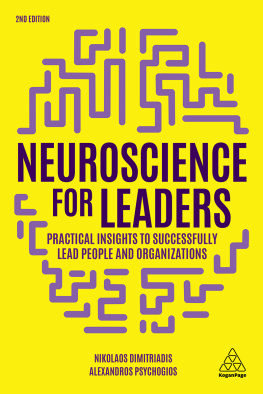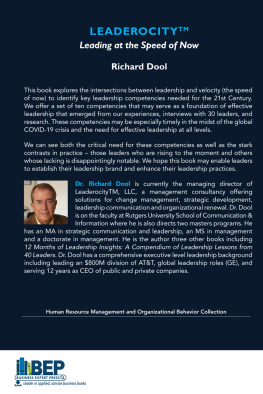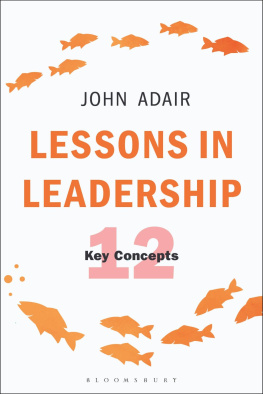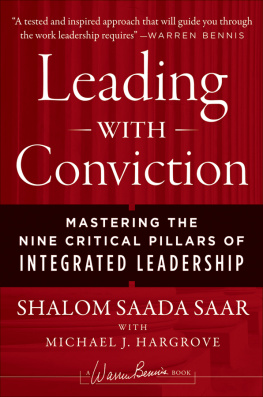Stanford University Press
Stanford, California
2014 by the Board of Trustees of the Leland Stanford Junior University.
All rights reserved.
No part of this book may be reproduced or transmitted in any form or by any means, electronic or mechanical, including photocopying and recording, or in any information storage or retrieval system without the prior written permission of Stanford University Press.
Special discounts for bulk quantities of Stanford Business Books are available to corporations, professional associations, and other organizations. For details and discount information, contact the special sales department of Stanford University Press. Tel: (650) 736-1782, Fax: (650) 736-1784
Printed in the United States of America on acid-free, archival-quality paper
Library of Congress Cataloging-in-Publication Data
Gauthier, Valrie, author.
Leading with sense : the intuitive power of savoir-relier / Valrie Gauthier; foreword by Warren Bennis.
pages cm
Includes bibliographical references and index.
ISBN 978-0-8047-8625-6 (cloth : alk. paper)
1. Leadership. 2. Interpersonal relations. 3. Social intelligence. 4. Management. I. Title.
HD57.7.G38 2014
658.4'092dc23
2014014042
ISBN 978-0-8047-9272-1 (electronic)
Typeset by Newgen in 10/15 Sabon
LEADING WITH SENSE
The Intuitive Power of Savoir-Relier
Valrie Gauthier
Foreword by Warren Bennis
STANFORD BUSINESS BOOKS
An Imprint of Stanford University Press
Stanford, California
CONTENTS
by Warren Bennis
ACKNOWLEDGMENTS
Arriving at this point in writing a book means you are close to closing. But for me there can be no end because this book is a journey where many have been and will be crossing paths in the ongoing quest for understanding and sharing. On these paths I have found unique beings whose support and presence have made this journey a true learning expedition. I wish to thank those people here whether they are flesh and blood or mind and spirit, even though I cannot name all of them.
The book would not exist without Jody Hoffer Gittell, who introduced me to Margo Beth Fleming, whose professional advice, timely encouragements, and acute revisions sharpened every chapter considerably. The bright inputs and insights from Laura McDiarmid helped me complete the work and meet the challenges set by the anonymous reviewers of the manuscript.
My debt also goes to the most inspirational encounters I made over the past decade: Warren Bennis, who as a dear friend kindly agreed to write the books foreword, and Theodore Zeldin, with whom I have been fortunate to work on and experience shared ideas. Inspiration also came with Edgar Morin, Ren Girard, and Yves Bonnefoy, who have driven my thoughts all the way, and the poets Mallarm, Baudelaire, Bishop, Frost, and Whitman, who are the essence of savoir-relier. I also want to thank those who have nourished and illustrated my ideas just by being who they are: Pascal Cagni, Clara Gaymard, and Apollonia Poilne.
My friend Philippe Gaud has been the attentive ear and presence, always ready to challenge my ideas and open new discussions. My students at HEC Paris, MIT Sloan, and NYU Stern have helped me take a step back from the book while experiencing savoir-relier and putting their own words on the experience. My husband, Danny, has helped rationalize some of that experience.
Finally, the genuine, generous, and generative support of my dear children, Julie and Geoffroy, made this endeavor worth the time and energy. They are the ultimate sense for me, and I dedicate this book to them.
Valrie Gauthier
December 2013
FOREWORD
by Warren Bennis
We hear it all the time: the world is moving at a fast pace, shattering our points of reference and our landmarks in time and space. The speed at which complexity is accelerating leaves little room for thinking for ourselves. Dealing with this complexity has become THE challenge. Organizations must embrace globalization to survive; families must compose, decompose, and recompose themselves; individuals must appreciate diverging viewpoints and value diversity. To do so they require a twenty-first-century approach and a new kind of leader, one who can reconcile sense of purpose with business.
Leading with Sense helps us do that. Its a fresh, new, and challenging look at business practices and leadership studies, both individual and organizational, that addresses sense of purpose and relationships with wit and candor. It reconciles effectiveness with integrity, hard work with well-being, peoples differences with positive interaction. It brings a sense of respect and understanding for others, including those strongly opposed to others views.
With a distinct French voice and a twist of American culture, Valrie Gauthier connects views and experiences across the European and North American continents while making global diversity a core component of her approach. Wherever you come from, she opens your mind so that you can find your own path and feel confident about acting on your ideas to create a better future for the world.
The book draws management inspiration from an unlikely source: poets. Poetry carries a universalism that opens the door to every single culture with respect for its uniqueness under the principle of rich and complex language. Poetry is all about delivering a message that provokes emotions, that inspires images and influences ideas, the same way that effective leaders must. Ive never seen someone find inspiration for pioneering business practices in poetry, but Valrie makes it seem obvious. Poets interpret symbols for the same purpose as business leaders: to create a sense of belonging and to forge an identity.
This book does the same. It creates links between peoples differences and explains why todays world needs light and meaning, intelligence and sensitivity. Leaders must be able to inspire confidence in others. Like poets, they must create a sense of purpose and embody the vision to help those around them build their own paths in the same way.
Todays businesses are looking for executives capable of managing complex situations, fitting into multidisciplinary departments, and steering multicultural teams. In this climate of high demand and higher expectations, mere technical ability is not enough. The ability to understand and collaborate with others, once considered a plus, has become an indispensable qualification. Valrie calls this quality savoir-relier, or relational know-how. This skill facilitates the development of relationships between individuals, cultures, and ideas. It is a defining characteristic of successful managers.
Further studies, such as the one conducted by Booz Allen Hamilton on recruiters expectations, confirm the importance of relational intelligence. Companies complain that although many candidates possess sound technical backgrounds and skills, they have difficulty fitting into organizations.
Today, relational intelligence is at the center of a number of theories concerning management and leadership training, including Koestenbaums Leadership Diamond, MacGregor Burnss model of transactional and transformational leadership, and LMX, or Vertical Dyad Linkage Theory. Concerns over human relations, team building, management, and corporate leadership have all been linked to the notion of relational intelligence.
Born of a reflection on poetry, and the strength of poetic language, the concept of savoir-relier has become the source of a wider reflection on the relationship between people to the world, and especially people to each other. Following the principles developed by British historian and philosopher Theodore Zeldin in his Intimate History of Humanity,
Next page








